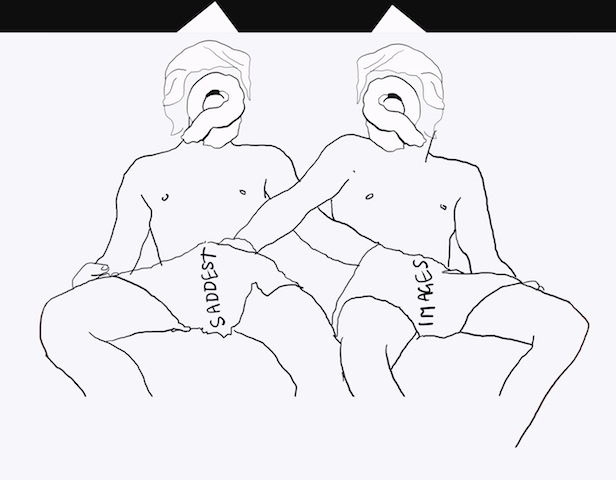Remember when the world became an itch for a deeper level? When a lot of us started to get the sense that almost everything around us was a laminated parody trying to appeal to aesthetics and terror and assumed ignorance? When the world became as much spin-induced apathy and the contagion of scary thoughts / abstract capital / winsome graphics as anything inter-galactic? When just switching between tabs on a laptop started to involve wading through multitude leagues of blubber between you and reality? When ‘reality’ appeared to be a viable alternative, somewhere out there, and not just an invention cooked up in a vat of desperately hopeful psyches?
You know how the story goes – a bunch of wealthy white men in suits composing game-changing policies from behind sticky desks, inventing fear and workplace protocol, calculating risk and return, dismantling honesty and welfare. All of them proficient in hunting and winning and high-level smarm offensives. Hell-bent on protecting their inheritance. Turning everything they touch the regulated blue of a pricey ballpoint. None of them willing to back down, admit it, give over.
Soon enough, it’s language they’re wounding, and it’s hurting most in the noun department: strivers, skivers, swarms, borders, walls, registers, reform, deficit, migrant… is it possible to encounter any of these nouns without thinking of the most tedious-dangerous binary party politics? A bunch of blameless words, now with tricky meanings behind every surface. The enormous stitch-up implied by the whole rhetorical system is almost palpable. It’s knackering, stumbling around, unable to find your footing inside the increasingly slippery substances. The minute you enter the simulation, the confused ache translates direct into your marrow.
The worst of it is the banality. These nouns are like deaths. The banality of thoughts about death is exorbitant.
Give me a language that hotwires my innards
I don’t know about you, but it makes me want to assert the right to be precise. When I read keen language, I feel I’m waking up in a time and place that’s not already written. I get proxy thrills of vitality, just wandering around it. We don’t have to call it poetry, but I’m surely mining for words and phrases that are sharp and eager, and at least a bit sexy. If language creates a reality, give me a language that isn’t oleaginous, or deferential, dripping with paranoia and tautology, that doesn’t preface every statement with, “Let me be QUITE CLEAR” or, “Well, what I would say is THIS”. (As Roland Barthes wrote, ‘The worst thing about (a show of) frankness is that in general it is an open door, and wide open, onto stupidity.’) Give me a language that hotwires my innards.
In South Carolina, there’s a web-famous Border collie I admire from the home-comfort of YouTube. ‘Chaser’ can not only identify and retrieve a thousand-plus objects, she can also respond to sentences with multiple elements of grammar, distinguishing between parts of speech, demonstrating a complex handle on human semantics. Chaser has set the bar for my own BC, Marj, and, as we’re learning, the key is: specificity. Don’t just say ‘ball’! Say ‘tennis ball’, ‘football’, ‘basketball’. ‘Fetch’, ‘come’, ‘drop’. These interspecies comms, actually connecting each verb and noun with its action and object (FETCH TENNIS BALL), reboots words and their referents. Marj and I are shoving metaphorical dynamite up language’s figurative asshole!
And then there’s Marj’s own proper noun, ‘Marj’, so we can get Marj to come running, which turns out to be another way to form connections and/or exert dominion. As it goes, I’m writing this from the island nation of Iceland, which is currently battling Iceland the supermarket over the use of ‘Iceland’, because Iceland the nation would like Icelandic firms to be able to use ‘Iceland’ and Iceland the supermarket’s not having it. ‘Iceland’ vs Iceland. Which is which? Who owns nouns? How to apply them – like ointment or tasers? ‘Where was it one first heard of the truth? The the’ (‘The Man on the Dump’, 1923, Wallace Stevens).
On a recent morning train out of London, on the foldout table opposite, I saw
FOOD
THAT’S
GOOD
on a coffee & croissant bag (looking like a replica/missing prop from John Carpenter’s They Live – thought getting hammered and dictated by corporate slogans / alien lifeforms, until… MELTDOWN) – a sleight of homographic print so convincing as to render the words a truism, but, by the same tactic (SPELLING IT OUT), extreme horseshit, the implication being that maybe the
FOOD
ISN’T THAT
GOOD
and so, in the instant of their declaration, the words revealed their dumbness. What resembled a message was in fact a shutdown. Confirmation that we’re not really meant to read these slogans, let alone answer back, “I doubt it! The whole entrance reeks of a chemically simulated bakery and passive-aggressive bullying!” These abundant, financially motivated, debased nouns are intended only to be mainlined to the colossal echo tube of inner space – admitted to our store of deep trash: unflushable.
From the March 2017 issue of ArtReview
